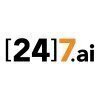
i
UST BlueConch
Technologies
Filter interviews by
UST BlueConch Technologies Interview Questions and Answers
10 Interview questions
I use techniques like MoSCoW, Kano model, Value vs Effort matrix, WSJF, and Cost of Delay to prioritize the backlog.
MoSCoW method - Must have, Should have, Could have, Won't have
Kano model - Basic needs, Performance needs, Excitement needs
Value vs Effort matrix - High value, Low effort items are prioritized
WSJF (Weighted Shortest Job First) - Calculating priority based on cost of delay and job size
Cost of Delay - ...
OOPS (Object-Oriented Programming) is a programming paradigm based on the concept of objects, which can contain data and code.
OOPS focuses on creating objects that interact with each other to solve a problem
It involves concepts like classes, objects, inheritance, polymorphism, and encapsulation
Classes are blueprints for creating objects, while objects are instances of classes
Inheritance allows a class to inherit p...
SCD stands for Slowly Changing Dimension, used in data warehousing to track changes in data over time.
SCD Type 1: Overwrites old data with new data
SCD Type 2: Creates new records for each change, maintaining history
SCD Type 3: Adds new columns to track changes without creating new records
SCD Type 4: Uses separate tables to store historical data
SCD Type 6: Hybrid approach combining Type 1 and Type 2
The project is a web-based application for managing inventory and sales in a retail store.
Developed using Java Spring framework
Utilized MySQL database for storing data
Implemented RESTful APIs for communication between frontend and backend
Included features like product management, sales tracking, and user authentication
Data flows in our project through various stages including input, processing, and output.
Data is first collected from various sources such as user inputs, databases, or external APIs.
The collected data is then processed using algorithms, logic, and rules defined in the software.
Processed data is stored in databases or sent to other systems for further analysis or presentation.
Examples include user input being vali...
A data warehouse is a centralized repository that stores structured and unstructured data from various sources for analysis and reporting.
Data warehouses are used for decision-making and business intelligence purposes.
They typically store historical data and are optimized for complex queries.
Examples of data warehouse tools include Amazon Redshift, Snowflake, and Google BigQuery.
I handle various technologies for QA automation, including tools for testing, scripting, and CI/CD integration.
Proficient in Selenium for web application testing.
Experience with TestNG and JUnit for test case management.
Utilized Jenkins for continuous integration and deployment.
Familiar with API testing using Postman and RestAssured.
Knowledge of version control systems like Git for collaboration.
Action class methods are used to perform keyboard and mouse actions in Selenium.
Action class is part of Selenium's WebDriver API
Methods include click(), doubleClick(), contextClick(), dragAndDrop(), etc.
Used to simulate user interactions with web elements
Can be used for testing complex user interactions like drag and drop, hover, etc.
OOPS (Object-Oriented Programming) is a programming paradigm based on the concept of objects, which can contain data and code.
OOPS focuses on creating objects that interact with each other to solve a problem
Key principles include encapsulation, inheritance, polymorphism, and abstraction
Encapsulation: bundling data and methods that operate on the data into a single unit
Inheritance: allows a class to inherit propert...
Smoke testing is a quick test to check if the basic functionalities of the software are working, while sanity testing is a more thorough test to check if the specific changes or fixes made to the software are working as expected.
Smoke testing is done to ensure the stability of the software build before proceeding with further testing.
Sanity testing is done to ensure that specific changes or fixes made to the softw...
UST BlueConch Technologies Interview Experiences
20 interviews found
(2 Questions)
- Q1. OOPS concept explain
- Ans.
OOPS (Object-Oriented Programming) is a programming paradigm based on the concept of objects, which can contain data and code.
OOPS focuses on creating objects that interact with each other to solve a problem
It involves concepts like classes, objects, inheritance, polymorphism, and encapsulation
Classes are blueprints for creating objects, while objects are instances of classes
Inheritance allows a class to inherit proper...
- Q2. Explain OOPS concept explain
- Ans.
OOPS (Object-Oriented Programming) is a programming paradigm based on the concept of objects, which can contain data and code.
OOPS focuses on creating objects that interact with each other to solve a problem
Key principles include encapsulation, inheritance, polymorphism, and abstraction
Encapsulation: bundling data and methods that operate on the data into a single unit
Inheritance: allows a class to inherit properties a...
I appeared for an interview in Apr 2025, where I was asked the following questions.
- Q1. Tell me about yourself
- Q2. Project architecture
- Q3. Java spring related question
(2 Questions)
- Q1. Explain project
- Ans.
The project is a web-based application for managing inventory and sales in a retail store.
Developed using Java Spring framework
Utilized MySQL database for storing data
Implemented RESTful APIs for communication between frontend and backend
Included features like product management, sales tracking, and user authentication
- Q2. Explain how data flow in your project
- Ans.
Data flows in our project through various stages including input, processing, and output.
Data is first collected from various sources such as user inputs, databases, or external APIs.
The collected data is then processed using algorithms, logic, and rules defined in the software.
Processed data is stored in databases or sent to other systems for further analysis or presentation.
Examples include user input being validated...
(2 Questions)
- Q1. What is data warehouse
- Ans.
A data warehouse is a centralized repository that stores structured and unstructured data from various sources for analysis and reporting.
Data warehouses are used for decision-making and business intelligence purposes.
They typically store historical data and are optimized for complex queries.
Examples of data warehouse tools include Amazon Redshift, Snowflake, and Google BigQuery.
- Q2. Explain SCD type
- Ans.
SCD stands for Slowly Changing Dimension, used in data warehousing to track changes in data over time.
SCD Type 1: Overwrites old data with new data
SCD Type 2: Creates new records for each change, maintaining history
SCD Type 3: Adds new columns to track changes without creating new records
SCD Type 4: Uses separate tables to store historical data
SCD Type 6: Hybrid approach combining Type 1 and Type 2
Interview Preparation Tips
Well designed tests to check your knowledge
(1 Question)
- Q1. Not your usual Q&Abut discussion based technical questions
(1 Question)
- Q1. General friendly discussion
Interview Preparation Tips
(2 Questions)
- Q1. Asked about technologies handles
- Ans.
I handle various technologies for QA automation, including tools for testing, scripting, and CI/CD integration.
Proficient in Selenium for web application testing.
Experience with TestNG and JUnit for test case management.
Utilized Jenkins for continuous integration and deployment.
Familiar with API testing using Postman and RestAssured.
Knowledge of version control systems like Git for collaboration.
- Q2. Years of expertise
(1 Question)
- Q1. Angular data communication
I applied via Campus Placement and was interviewed before Apr 2023. There were 4 interview rounds.
The test contained 5 aptitude questions and 1 coding question based on array it as easy to crack
Basic Group discussion where they check our communication skills and how we present our idea
(3 Questions)
- Q1. Technical round was of 45-50 min all questions based on resume were asked
- Q2. Based on resume,puzzle
- Q3. Code to reverse string
(1 Question)
- Q1. Final discussion round on benefits of oraganization and work culture
Skills evaluated in this interview
I applied via Referral and was interviewed before Dec 2023. There was 1 interview round.
(2 Questions)
- Q1. How you handle conflict within team
- Ans.
I address conflict within the team by promoting open communication, active listening, and facilitating constructive discussions.
Encourage team members to express their concerns and perspectives openly
Actively listen to all parties involved to understand their viewpoints
Facilitate constructive discussions to find common ground and resolve conflicts peacefully
- Q2. What prioratization techniques you use to arrive at priority of the backlog.
- Ans.
I use techniques like MoSCoW, Kano model, Value vs Effort matrix, WSJF, and Cost of Delay to prioritize the backlog.
MoSCoW method - Must have, Should have, Could have, Won't have
Kano model - Basic needs, Performance needs, Excitement needs
Value vs Effort matrix - High value, Low effort items are prioritized
WSJF (Weighted Shortest Job First) - Calculating priority based on cost of delay and job size
Cost of Delay - Prior...

(1 Question)
- Q1. Java angular spring boot javascrip html
(1 Question)
- Q1. Salary discussion

(1 Question)
- Q1. About basic testing
I applied via Naukri.com and was interviewed before Apr 2023. There were 2 interview rounds.
(1 Question)
- Q1. Basic Java 8 questions. Exception Hierarchy, Stream bases practical questions and Collection Framework.
(1 Question)
- Q1. Normal HR round.
Interview Preparation Tips
Good Luck
Top trending discussions







UST BlueConch Technologies Interview FAQs
The duration of UST BlueConch Technologies interview process can vary, but typically it takes about less than 2 weeks to complete.
Tell us how to improve this page.
UST BlueConch Technologies Interviews By Designations
- UST BlueConch Technologies Senior Software Engineer Interview Questions
- UST BlueConch Technologies QA Engineer Interview Questions
- UST BlueConch Technologies UI Developer Interview Questions
- UST BlueConch Technologies Software Engineer Interview Questions
- UST BlueConch Technologies Software Developer Interview Questions
- UST BlueConch Technologies Java Software Engineer Interview Questions
- UST BlueConch Technologies QA Automation Engineer Interview Questions
- UST BlueConch Technologies Senior QA Engineer Interview Questions
- Show more
Interview Questions for Popular Designations
- Associate Interview Questions
- Software Engineer Interview Questions
- Software Developer Interview Questions
- Senior Engineer Interview Questions
- Sales Executive Interview Questions
- Consultant Interview Questions
- Associate Software Engineer Interview Questions
- Senior Software Engineer Interview Questions
- Show more
Overall Interview Experience Rating
based on 13 interview experiences
Difficulty level
Duration
Interview Questions from Similar Companies
UST BlueConch Technologies Reviews and Ratings
based on 199 reviews
Rating in categories
|
Senior Software Engineer
206
salaries
| ₹9 L/yr - ₹27.3 L/yr |
|
Software Engineer
110
salaries
| ₹4.5 L/yr - ₹19 L/yr |
|
Softwaretest Engineer
100
salaries
| ₹3.1 L/yr - ₹6.5 L/yr |
|
Senior QA Engineer
61
salaries
| ₹6.5 L/yr - ₹15.7 L/yr |
|
QA Engineer
55
salaries
| ₹3 L/yr - ₹9 L/yr |

Oracle

Amdocs

Automatic Data Processing (ADP)

24/7 Customer
- Home >
- Interviews >
- UST BlueConch Technologies Interview Questions










